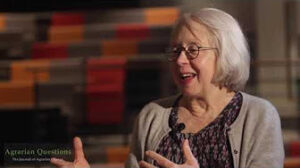An Interview with Bridget O’Laughlin
Bridget O’Laughlin is among the leading Marxist intellectuals and anthropologists of our times and a major contributor to the field of agrarian political economy. With a life and scholarship spanning three continents (North America, Africa and Europe), Bridget’s oeuvre is not just varied in terms of the subjects and regions covered but also analytically and methodologically unique. She retired from the Institute of Social Studies (ISS) in The Hague, Netherlands and is one of the editors of the Journal of Agrarian Change.
Agrarian Questions is delighted to present an interview with Bridget O’ Laughlin by Helena Pérez Niño. Helena is Lecturer in Development Studies at the University of Cambridge and is also one of the Journal’s editors. In this eight-part interview, Bridget discusses wide-ranging issues such as the link between production relations and collective resistance, social reproduction, questions of public health, mainstream development discourse and practice, and research methodology. She takes us through the significance in her scholarship of the idea of ‘contingency’ which allows her to combine analysis of historically-developed structural conditions with possibilities of collective action. Bridget also reflects on the roots of the recent discussion on ‘social reproduction’ in feminist scholarship and why she finds the dualism between production and social reproduction analytically unproductive.
Drawing on her long-standing research in southern Africa, she engages with ideas on proletarianization, classes of labour and the politics emerging from multi-class situations. The conversation also brings to light her abiding commitment to critically examining the scholarship on mainstream development concepts (such as corporate social responsibility and local governance), public health and inequality through the lens of class relations. Further, she impresses upon the importance of robust methodology, especially a deeper qualitative engagement with the field, to study these concepts and issues.
Through all this and more, Bridget offers an exciting and challenging intellectual and political agenda for future research in the Marxist and critical agrarian political economy tradition, prompting those of us pursuing such scholarship to consider seriously whether we are asking the right questions.

